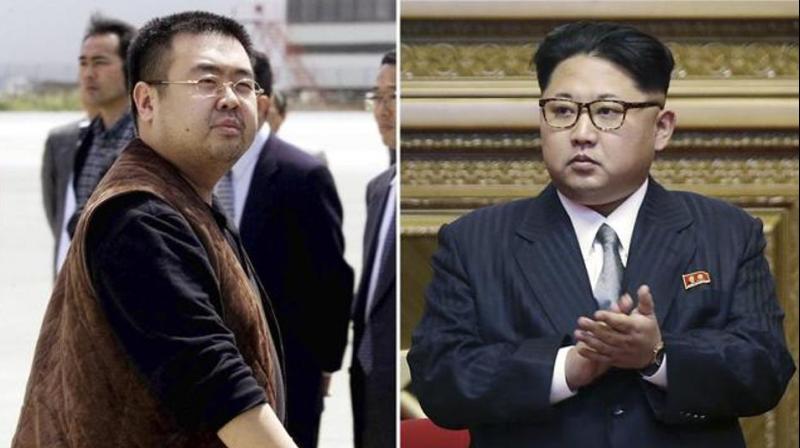After first assassination attempt, Kim's brother pleaded for his life: Seoul MPs

Seoul: The half-brother of North Korean leader Kim Jong-Un, who was murdered in Malaysia, had pleaded for his life after an assassination attempt in 2012, Seoul’s spy chief said Wednesday, illustrating the dangers of being born into a brutal dynasty.
Kim Jong-Nam, eldest son of the late former leader Kim Jong-Il, died after reportedly being attacked by two women -- said by Seoul to be agents of North Korea -- at Kuala Lumpur International Airport on Monday.
He was once seen as heir apparent but fell out of favour following an embarrassing botched bid in 2001 to enter Japan on a forged passport and visit Disneyland.
The Kim family has ruled the impoverished country since its creation in 1948 with an iron fist and a pervasive personality cult.
But following his fall from grace Jong-Nam had lived in virtual exile, mainly in the Chinese territory of Macau. Despite being the younger son, it was Jong-Un who took over the isolated and nuclear-armed state after the death of his father in December 2011.
Although Jong-Nam kept his distance from domestic politics, the North in 2012 tried to assassinate him, Seoul lawmakers said, following a closed-door briefing by the chief of the National Intelligence Service, Lee Byung-Ho.
“According to (Lee)... there was one bid in 2012, and Jong-Nam in April 2012 sent a letter to Jong-Un saying ‘Please spare me and my family’,” Kim Byung-Kee, a member of the parliamentary intelligence committee, told reporters.
“It also said ‘We have nowhere to go... we know that the only way to escape is suicide’,” he said, adding Jong-Nam had scant political support and posed little threat to Jong-Un.
His murder echoed the fate of his uncle Jang Song-Thaek, who was executed in Pyongyang in December 2013 for charges including treason and bribery.
Jang, an advocate of economic reform known to be close to China, played a key role in Jong-Un’s rise but his growing power was believed to have irritated the young ruler.
In his final days, Jang -- once one of the most powerful men in the country -- was described by state media as “despicable human scum”. Rumours of his execution by anti-aircraft gun fuelled fears.
The latest assassination, if confirmed as the North’s work, is more an indication of Jong-Un’s “paranoid personality” than a calculated move to remove a political threat, the legislator quoted the spy chief as saying.
Jong-Nam was the eldest son of Kim Jong-Il with his first wife, and in the deeply patriarchal North the first son is seen as the official heir of the family. The country’s founding father Kim Il-Sung passed on the helm to his first son Kim Jong-Il upon his death in 1994.
But the succession instead went to Jong-Un, who was born to Jong-Il’s third wife.
Jong-Nam -- believed to have ties with Beijing’s elite -- was a relatively outspoken figure, publicly criticising Pyongyang’s political system on a few occasions.
The 45-year-old, who had once studied in Moscow and Geneva, said he “personally opposed” the hereditary power transfer in his own family, during an interview with Japan’s Asahi TV in 2010.
One of his sons -- Han-Sol -- described his uncle Jong-Un as a “dictator” in a rare interview with a Finnish TV station in 2012 while he was studying in Europe.
Now he is holed up in Macau with his family, said Seoul lawmaker Lee Cheol-Woo, another intelligence committee member briefed by the South’s spy chief.
“They are under the protection of the Chinese authorities,” Lee said.
Some of those close to the North’s ruling family, fearful of an unpredictable future, chose to flee. An aunt and uncle of Jong-Un left for the US in 1998 and now live a normal existence as owners of a New York dry cleaning business.
Others were less fortunate.
Yi Han-Yong, a nephew of Jong-Nam’s mother Sung Hye-Rim, publicly criticised the ruling Kim family in his memoir and numerous media interviews after defecting to Seoul in 1982.
He was shot dead outside his home in 1997 in what Seoul’s spy agency described as an assassination by North Korean agents. Yi reportedly muttered “spies” before dying. His attackers were never found.

